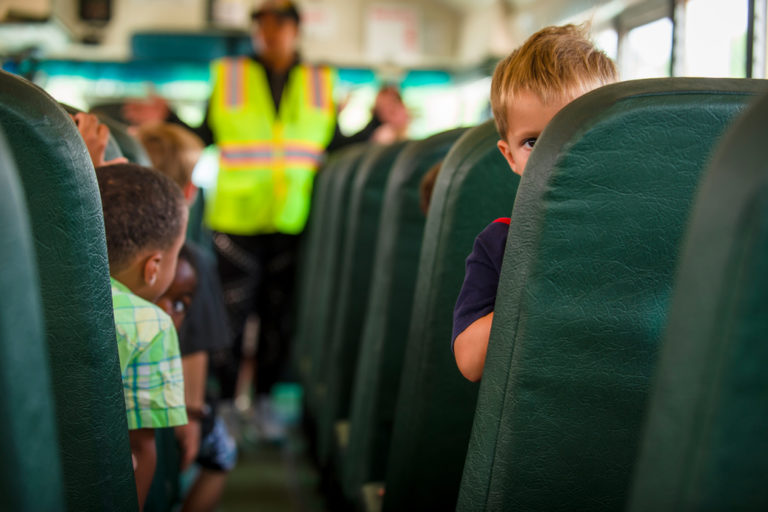
Image by Howard County Library System/Flickr, Some Rights Reserved.
Parenting Like a Citizen
The feminist movement has successfully popularized the profound phrase:
“The personal is the political.”
And that it is, particularly when it comes to the joys and challenges of parenting. There are political implications to so much of our mundane, daily behavior — from what we feed our kids to when and how much we read to them to how we pay and even speak to our childcare providers. But I’m learning that parenting, one of the most personal things possible, is also political, and having some sense of how to strategically act on that knowledge are two very different things.
Case in point: while navigating the preschool admissions process for our daughter, I quickly found myself overwhelmed by the amount of information. This probably varies in different parts of the country, but it turns out that for a fall admission to a non-Head Start preschool in Oakland, parents have to begin going to open houses, registering for tours, and filing paperwork, including admissions fees of around , a year in advance. And there are different approaches to learn about: Montessori vs. Waldorf vs. Reggio-Emilia. There are varying schedules and prices, expectations about parent involvement and food, and even what clothing children will wear (e.g., a Star Wars t-shirt at one school is seen as glamorizing violence).
Now here is where “the personal is the political”: if my sense of overwhelm were just personal, it would be frustrating but tolerable. What I realized was that my sense of overwhelm was directly connected to a deeper truth, which is that by the time American children are three years old, they are already being tracked based on a system that requires a tremendous amount of vigilance, disposable income and time, and specialized knowledge.
I have never felt like such a white parent as I did on preschool tours, surrounded by all of these other mostly middle- and upper-middle-class white and Asian people in their 30s, asking what so often felt like comically specific and sophisticated questions about little people who don’t even wipe their own butts yet: What sort of exposure will my child get to math, science, and engineering? What’s your philosophy regarding introverted vs. extroverted leadership development? Are packaged foods allowed?
It’s not that I don’t want the best for my kid. It’s that I don’t want to be part of a system that makes “what’s best” a privilege, only accessible by people who already have the time, money, and know-how to provide their kids with educational enrichment. So what could I do about it?

First, I reasoned, I could take my current slate of options for my daughter and try to pick the school that makes itself most accessible to kids from lower economic backgrounds. I liked this, at first. Not only would I be supporting an institution that was integrating an equity analysis into their structure, but I’d be giving my kid a more accurate social experience of the real world. I believe diversity is good for everyone, even and especially white, well-off kids like my daughter. But the more I thought about this, the more it felt like I would really just be choosing the least unequal of the unequal choices. Deep down, I was motivated from a largely self-interested place — my kid will experience diversity.
I decided to opt for a second option. I’m sending my kid to a school based on what best fits my family — schedule, price, vibe, and, yes, diversity — and pursuing the political work as a separate effort of sorts. I’m a journalist, so I did what I know to do best in moments like these: figure out what my research questions are and start reading. In this case, they were: Where do poor kids in Oakland go to preschool? How do their parents find and afford these experiences, and of what quality are they? Who is already working on these issues?
Here’s just a snapshot of what I learned. About 2,000 kids are served in Oakland Head Start and Early Head Start programs every year, the quality of which is hotly debated. A family the size of mine has to make a gross annual income of ,396 or less to qualify for services. The application forms we were forced to fill out ended up looking like a cakewalk next to the ones required by Head Start, including 11 separate forms of documentation. And, of course, the Enrollment & Eligibility Office is only open from 8:30 a.m. to 4 p.m., when most working parents are hustling at their jobs.
I started a conversation with a friend, also the mother of a toddler in the neighborhood, about using our own network of friends to spark a bigger conversation and maybe even think about forming a “giving circle” focused on local issues. Preschool is already taxing on a lot of our budgets, so this might be a stretch, but perhaps together we can take a redistributive approach that feels radical at a small scale.
This approach feels like a false divide in so many ways, but I like the sense that my activism isn’t just about personal consumerism, but rooted in a larger commitment to learn and organize the power going unused all around me. It’s so easy to express our outrage and then shrug our shoulders.
There is no end to research that proves early childhood development is key to almost everything that leads to human flourishing. I’m certainly not the first parent who has thought, Why should the most critical educational experience an American has be so segregated by race and class in 2016?
But our kids grow fast and we move on to the next maddening thing about America’s false promise of equality. Parenting is political, sure, but who has time to act on it when they’re in the throes of family life, which are stressful for even the most well-resourced among us? The long tail of systemic reform keeps getting cut off as families move on to different ages and different stages. I’d like to be part of the solution, not just while I’m chasing after my own toddler, but for the long haul.
I know that parenting is not just a private matter, defined by my consumer choices. I don’t want my success as a parent to be solely defined by my kid’s achievements, however they are measured. I want my success as a parent to be intertwined with my success as an awake, engaged citizen. I’m still figuring out what that looks like in this context of this messy, beautiful moment.


Share your reflection